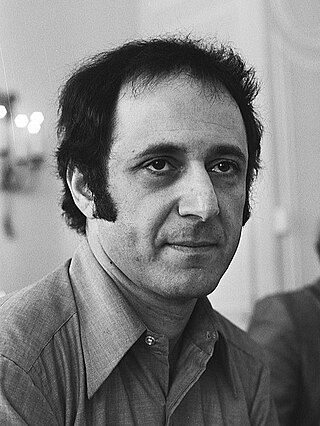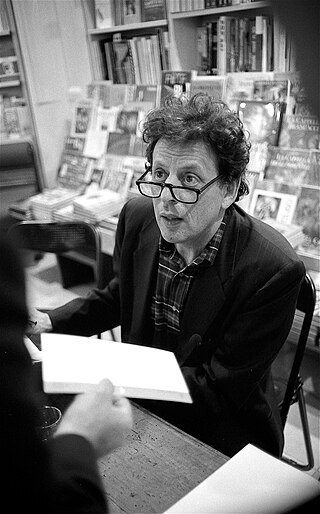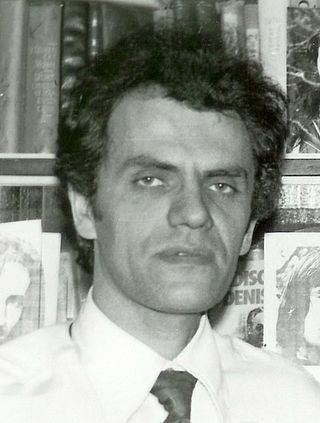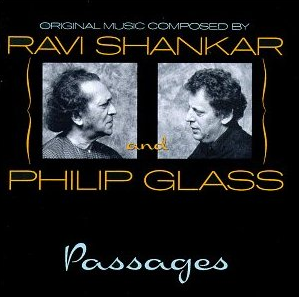
Philip Glass is an American composer and pianist. He is widely regarded as one of the most influential composers of the late 20th century. Glass's work has been associated with minimalism, being built up from repetitive phrases and shifting layers. Glass describes himself as a composer of "music with repetitive structures", which he has helped to evolve stylistically.

In music, a quartet is an ensemble of four singers or instrumental performers.

Stephen Michael Reich is an American composer best known as a pioneer of minimal music in the mid to late 1960s. Reich's work is marked by its use of repetitive figures, slow harmonic rhythm, and canons. Reich describes this concept in his essay, "Music as a Gradual Process", by stating, "I am interested in perceptible processes. I want to be able to hear the process happening throughout the sounding music." For example, his early works experiment with phase shifting, in which one or more repeated phrases plays slower or faster than the others, causing it to go "out of phase." This creates new musical patterns in a perceptible flow.
Music for a Large Ensemble is a piece of music written by Steve Reich in 1978. It is scored for violin 1, violin 2, cellos, 2 flutes, 2 clarinets, 2 soprano saxophones, 4 trumpets, 4 pianos, 2 marimbas, vibraphone, 2 xylophones and two female voices.

Einstein on the Beach is an opera in four acts composed by Philip Glass with libretto in collaboration with Robert Wilson, who also designed and directed early productions. The opera eschews traditional narrative in favor of a formalist approach based on structured spaces laid out by Wilson in a series of storyboards which are framed and connected by five "knee plays" or intermezzos. The music was written "in the spring, summer and fall of 1975.""mostly in Cape Breton, Nova Scotia." Glass recounts the collaborative process: "I put [Wilson’s notebook of sketches] on the piano and composed each section like a portrait of the drawing before me. The score was begun in the spring of 1975 and completed by the following November, and those drawings were before me all the time."

Meredith Jane Monk is an American composer, performer, director, vocalist, filmmaker, and choreographer. From the 1960s onwards, Monk has created multi-disciplinary works which combine music, theatre, and dance, recording extensively for ECM Records. In 1991, Monk composed Atlas, an opera, commissioned and produced by the Houston Opera and the American Music Theater Festival. Her music has been used in films by the Coen Brothers and Jean-Luc Godard. Trip hop musician DJ Shadow sampled Monk's "Dolmen Music" on the song "Midnight in a Perfect World". In 2015, she was awarded the National Medal of Arts by Barack Obama.

Steve Reich and Musicians, sometimes credited as the Steve Reich Ensemble, is a musical ensemble founded and led by the American composer Steve Reich. The group has premiered and performed many of Reich's works both nationally and internationally. In 1999, Reich received a Grammy Award for "Best Small Ensemble Performance " for the ensemble's performance of Music for 18 Musicians.
Alice Shields is an American classical composer. She is one of the pioneers of electronic music, and is particularly known for her cross-cultural operas.

The Photographer is a three-part mixed media performance accompanied by music by composer Philip Glass. The libretto is based on the life and homicide trial of 19th-century English photographer Eadweard Muybridge. Commissioned by the Holland Festival, the opera was first performed in 1982 at the Royal Palace of Amsterdam.

Alexander Kuzmich Vustin, also Voustin or Wustin was a Russian composer. His works, including the opera The Devil in Love, were played and recorded internationally.
Chamber opera is a designation for operas written to be performed with a chamber ensemble rather than a full orchestra. Early 20th-century operas of this type include Paul Hindemith's Cardillac (1926). Earlier small-scale operas such as Pergolesi's La serva padrona (1733) are sometimes known as chamber operas.

Passages is a collaborative chamber music studio album co-composed by Ravi Shankar and Philip Glass, released in 1990 through Private Music. Consisting of arrangements by each of the composers around themes written by the other, the album's content is a hybrid of Hindustani classical music and Glass' distinct American minimal contemporary classical style. The album reached a peak position of number three on Billboard's Top World Music Albums chart.
Dan Welcher is an American composer, conductor, and music educator.
Arthur "Art" Bixler Murphy was a classical and jazz musician, pianist and composer. He was born in Princeton, New Jersey. He grew up in Oberlin, OH, where his father was a member of the Oberlin College faculty.
Crash Ensemble is an Irish new music ensemble, which performs a range of contemporary classical music, as well as touring and organising festivals.

Pentatone is an international classical music label located in Baarn, Netherlands.
Michael Riesman is a composer, conductor, keyboardist, and record producer, best known as Music Director of the Philip Glass Ensemble and conductor of nearly all of Glass' film scores.

Amir Shpilman is an Israeli composer.
Caleb Burhans is an American composer, singer, and multi-instrumentalist in the contemporary/modern music scene. He has been commissioned by Lincoln Center, Carnegie Hall, the Library of Congress, and the Kronos Quartet. His works have been performed by ensembles such as the JACK Quartet, Roomful of Teeth, and eighth blackbird. He is a founding member of Alarm Will Sound, Ensemble Signal, and the Wordless Music Orchestra. He has worked with a diverse array of artists from Arcade Fire, The National, and Paul McCartney to Max Richter, Jóhann Jóhannsson, George Crumb, and Steve Reich.









